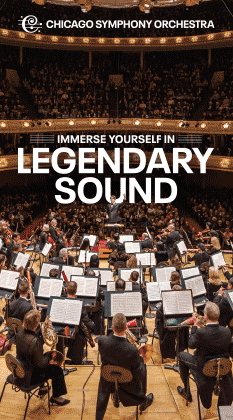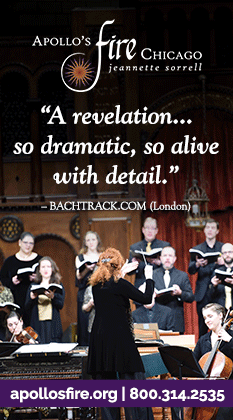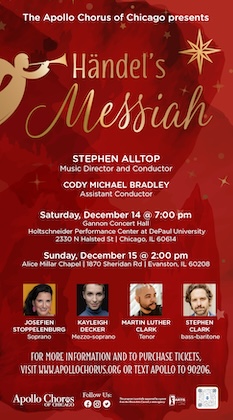Andy Vores’ riveting “No Exit” a combustible winner for Chicago Opera Vanguard
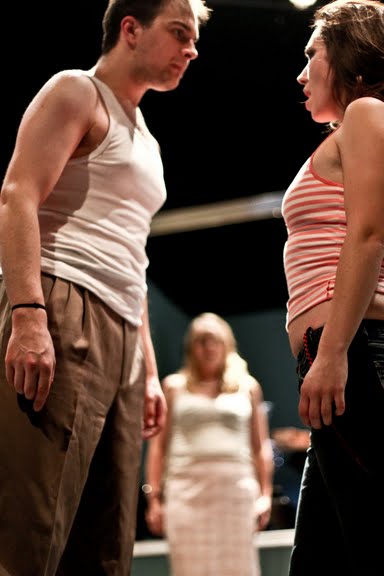
A successful philosophical opera? Get real.
Of course, Richard Strauss managed to write a masterpiece with his Nietzschean tone poem Also Sprach Zarathustra. And, many, including Wagner himself, would point to the Ring cycle and Parsifal as music dramas with firm philosophical underpinnings. But how many memorable arias have been adapted from Schopenhauer or inspired by Cartesian dualism?
Jean-Paul Sartre’s No Exit would seem an unlikely inspiration for opera. The theatrically effective but verbose play depicts three characters who realize they are in hell, and, as their memories of earthly life fade and dark secrets are revealed, the trio proceed to seduce, torment and torture each other, coming to the ultimate realization that “hell is other people.”
With No Exit, composer Andy Vores has crafted a compelling, fizzing opera that conveys the acerbic sting and philosophical texture of Sartre’s existential drama with daring, imagination and surprisingly bravura vocal writing. Throughout the unbroken 80-minute span, Vores’ music enhances the play’s action without—as so often in traditional opera—ever seeming grafted on for mere showy vocal effect.
In a riveting opening performance Friday night at The Center on Halsted, Chicago Opera Vanguard’s production blazingly achieves the synthesis for which Eric Reda created his company—a combustible mix of edgy storefront theater and experimental operatic music. There are only three more performances and lovers of off-Loop theater as well as contemporary opera should not miss this show.
Vores has sheared down his astringent yet lyrical style to the barest bones for a four-piece ensemble of viola, cello, soprano saxophone and percussion. There is quasi-Minimalist repetition and a limited harmonic palette of six pitches (played at the outset by the sax), which adds to the feeling of claustrophobia on stage.
Vores’ triadic structure cleverly reflects the three protagonists in Sartre’s hell as well as the romantic trio each was involved in, which led to their current destination. (It also reflects Sartre’s own polyamorous triads with Simone de Beauvoir and a revolving parade of third parties.)
The score Vores has crafted for No Exit is edgy, audacious and often ingenious. From an initial spare, Britten-like conversational style, the music accelerates and the instrumental and vocal lines become increasingly jumpy and virtuosic as the characters’ desperation mounts, with vaulting leaps and guttural growls. No Exit is an opera that deserves to be widely performed and discussed, and in its artful editing and refitting, can serve as a model of effective musical adaptation of literary sources.
Vores’ brilliant score would not make such a strong impact were it not for the superb direction of George Cederquist and a trio of gifted young singer-actors who threw themselves into the action with daunting intensity.
As the journalist/army deserter Garcin, Matthew Newlin displayed a pleasing, pliant tenor and easy stage manner, nicely setting the initial character of the besieged adulterous everyman and singing his solo opportunities with warmth and notably clear diction.
Soprano Susan Nelson’s earthy presence lacked the society hauteur for Estelle, but she rose to the vocal and dramatic challenges of the later scenes with firm conviction. Peter Weathers was aptly nondescript in the small role of the Valet, the insanely stratospheric falsetto writing Vores crafted for the character as jarring as it was meant to be.
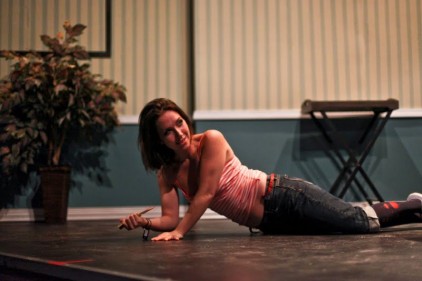
It is the lesbian clerk Inez who is the centerpiece of No Exit and Caitlin McKechney delivered a staggering performance. Following her impressive company debut last spring as the Wife in COV’s staging of Mark-Anthony Turnage’s Greek, McKechney was a tough, hipster Inez yet with a sensual, charismatic presence of feline grace.
The cat-eyed mezzo-soprano proved alluring in her seduction of Estelle and brought impassioned fury to the punishing vocal lines. McKechney charted Inez’s evolution from ironic disinterested observer to vulnerable and ultimately destroyed victim, her light mezzo as affecting in the aria-like moments as in the angry confrontations, spitting out Vores’ imprecations, grunts and unintelligible sounds.
Izumi Inaba’s L-shaped living room of low-rise furniture effectively painted a scenic design of timeless bourgeois tack. The musicians’ placement on a window-like platform riser made for an intriguing visual as well as deft separation of voices and instruments. The singers projected well in the dry but intimate setting, handicapped somewhat in the quiet final moments by the noisy, irritatingly fitful heating unit.
George Cederquist’s direction was faultless, drawing searing performances from his singers against the understated staging. Kudos to offstage conductor Emanuele Andrizzi and the ensemble (violist Alexander Baldock, percussionist Joseph Gonzalez, cellist Jeremy Ward and soprano saxophonist Sean Patayanikorn) for gracefuly handling the myriad challenges of Vores’ score. Props especially to artistic director Eric Reda for bringing audiences the Chicago premiere of Andy Vores’ extraordinary opera.
Chicago Opera Vanguard presents No Exit at 8 p.m. Saturday and 3 p.m. Sunday at The Center on Halsted, 3635 North Halsted, and Oct. 30 in Evanston at Northwestern University’s Lutkin Hall. www.chicagovanguard.org.
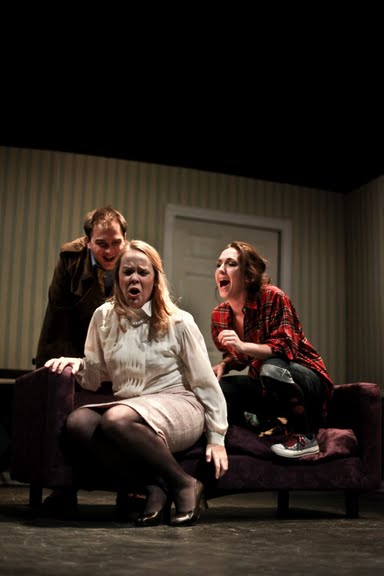
Posted in Performances
